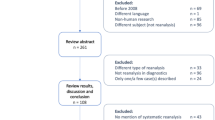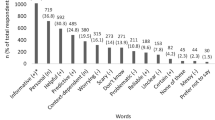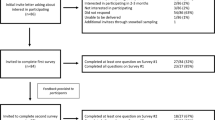Abstract
The implementation of next-generation sequencing (NGS) in diagnostic practice has stimulated ongoing debates on how to construct and perform “good” genomic care. Our multi-sited qualitative fieldwork at two large European centres for human genetics (CHGs) revealed tangible ambivalence in beliefs, norms, and actions in the enactment of NGS practices across sites stemming from differing expectations, interests, demands, and tensions. First, ambivalence was present around the boundaries of clinical diagnostic genetic care. The overlap between research and clinical work and diagnostics and screening led to ambivalence around “best” practices and norms concerning whom to offer NGS testing and how far to take testing. Secondly, the clinical value of NGS results, especially VUS and unsolicited findings, was ambivalently valued, resulting in an inconsistent approach towards these types of findings. Thirdly, ambivalence was recognized in applying guidelines in the reality of clinical practice. The ambivalence we encountered was often not made explicit or acknowledged, causing a failure to benefit from its possibility to encourage reflexivity and change. We propose to facilitate a more explicit ethical choreography [27], where ethics and science are developed iteratively whilst welcoming different perspectives and disciplines. Pulling experiences and practices of ambivalence into the light can help to understand the points of tension in the values and internal logic in care practices within the CHGs and facilitate a more informed, transparent, and consciously chosen direction for genetic care.
This is a preview of subscription content, access via your institution
Access options
Subscribe to this journal
Receive 12 print issues and online access
$259.00 per year
only $21.58 per issue
Buy this article
- Purchase on Springer Link
- Instant access to full article PDF
Prices may be subject to local taxes which are calculated during checkout
Similar content being viewed by others
Data availability
The data that support the findings of this study are available on request from the corresponding author. The data are not publicly available due to them containing information that could compromise research participant privacy/consent.
References
Matthijs G, Souche E, Alders M, Corveleyn A, Eck S, Feenstra I, et al. Guidelines for diagnostic next-generation sequencing. Eur J Hum Genet. 2016;24:2–5.
Mattick JS, Dinger M, Schonrock N, Cowley M. Whole genome sequencing provides better diagnostic yield and future value than whole exome sequencing. Med J Aust. 2018;209:197–9.
Kuiper JML, Borry P, Vears DF, Van Hoyweghen I. The social shaping of a diagnosis in next generation sequencing. N. Genet Soc. 2021;40:425–48.
Horton RH, Lucassen AM. Recent developments in genetic/genomic medicine. Clin Sci. 2019;133:697–708.
Nowotny H. Insatiable curiosity: innovation in a fragile future. Cambridge, Massachusetts: MIT Press; 2008.
Bruun MH, Wahlberg A, Douglas-Jones R, Hasse C, Hoeyer K, Kristensen DB, et al. editors. The Palgrave handbook of the anthropology of technology [Internet]. Singapore: Springer Nature Singapore; 2022. Available from: https://link.springer.com/10.1007/978-981-16-7084-8. Accessed 10 Jan 2023.
Vears DF, Sénécal K, Borry P. Reporting practices for variants of uncertain significance from next generation sequencing technologies. Eur J Med Genet. 2017;60:553–8.
Dove ES, Chico V, Fay M, Laurie G, Lucassen AM, Postan E. Familial genetic risks: how can we better navigate patient confidentiality and appropriate risk disclosure to relatives? J Med Ethics. 2019;45:504–7.
Horton R, Lucassen A. Consent and autonomy in the genomics era. Curr Genet Med Rep. 2019;7:85–91.
Wynn J, Lewis K, Amendola LM, Bernhardt BA, Biswas S, Joshi M, et al. Clinical providers’ experiences with returning results from genomic sequencing: an interview study. BMC Med Genom. 2018;11:45.
on behalf of the ESHG Public and Professional Policy Committee, van El CG, Cornel MC, Borry P, Hastings RJ, Fellmann F, et al. Whole-genome sequencing in health care: recommendations of the european society of human genetics. Eur J Hum Genet. 2013;21:580–4.
Kalia SS, Adelman K, Bale SJ, Chung WK, Eng C, Evans JP, et al. Recommendations for reporting of secondary findings in clinical exome and genome sequencing, 2016 update (ACMG SF v2.0): a policy statement of the American College of Medical Genetics and Genomics. Genet Med. 2017;19:249–55.
Richards S, Aziz N, Bale S, Bick D, Das S, Gastier-Foster J, et al. Standards and guidelines for the interpretation of sequence variants: a joint consensus recommendation of the American College of Medical Genetics and Genomics and the Association for Molecular Pathology. Genet Med. 2015;17:405–23.
Claustres M, Kožich V, Dequeker E, Fowler B, Hehir-Kwa JY, et al. Recommendations for reporting results of diagnostic genetic testing (biochemical, cytogenetic and molecular genetic). Eur J Hum Genet. 2014;22:160–70.
Arribas‐Ayllon M, Sarangi S, Clarke A. Professional ambivalence: accounts of ethical practice in childhood genetic testing. J Genet Couns. 2009;18:173–84.
Zarhin D. Contesting medicalisation, doubting the diagnosis: patients’ ambivalence towards the diagnosis of Obstructive Sleep Apnoea. Socio Health Illn. 2015;37:715–30.
Whooley O. Diagnostic ambivalence: psychiatric workarounds and the diagnostic and statistical manual of mental disorders: diagnostic ambivalence in psychiatry. Socio Health Illn. 2010;32:452–69.
Kerr A, Franklin S. Genetic Ambivalence: Expertise, Uncertainty and Communication in the Context of New Genetic Technologies. In: Webster A, editor. New Technologies in Health Care. London: Palgrave Macmillan UK; 2006. p. 40–53.
Pienaar K, Petersen A. Searching for diagnostic certainty, governing risk: patients’ ambivalent experiences of medical testing. Socio Health Illn. 2022;44:25–40.
Moore B, Nelson RH, Ubel PA, Blumenthal-Barby J. Two minds, one patient: clearing up confusion about “ambivalence”. Am J Bioeth. 2022;22:37–47.
Hackett EJ. Essential tensions: identity, control, and risk in research. Soc Stud Sci. 2005;35:787–826.
Benjamin R. Organized ambivalence: when sickle cell disease and stem cell research converge. Ethn Health. 2011;16:447–63.
Mitroff II. Norms and counter-norms in a select group of the apollo moon scientists: a case study of the ambivalence of scientists. Am Socio Rev. 1974;39:579.
Arribas-Ayllon M, Bartlett A. Sociological ambivalence and the order of scientific knowledge. Sociology. 2014;48:335–51.
Merton RK. Sociological ambivalence and other essays. New York: Free Press; 1976.
Nadai E, Maeder C. Fuzzy fields. multi-sited ethnography in sociological research.
Thompson C. Good science: the ethical choreography of stem cell research. Cambridge, Massachusetts: MIT Press; 2014.
Meyer CB. A case in case study methodology. Fields Methods. 2001;13:329–52.
de Wert G, Dondorp W, Clarke A, Dequeker EMC, Cordier C, et al. Opportunistic genomic screening. Recommendations of the European Society of Human Genetics. Eur J Hum Genet. 2021;29:365–77.
Greenhough B, Davies G, Bowlby S. Why ‘cultures of care’? Soc Cult Geogr. 2023;24:1–10.
Acknowledgements
We wish to thank all participants who generously agreed to be part of this research.
Funding
Operational Infrastructure Support Program, Victorian State Government; European Union’s Horizon 2020 research and innovation program, Grant/Award Numbers: 825903, 101057721; KU Leuven Internal Funds (C1), Grant/Award Number: 3H180506; Hilde Van Esch is a clinical investigator of FWO Vlaanderen.
Author information
Authors and Affiliations
Contributions
JMLK: Conceptualization (equal); investigation (lead); formal analysis (lead); project administration (lead); writing – original draft (lead); writing – review and editing (equal). PB: Conceptualization (equal); Supervision (equal); writing - review and editing (equal). DFV: Conceptualization (equal); Supervision (equal); writing - review and editing (equal). HVE: Project administration (supporting); resources (lead); supervision (equal); writing - review and editing (equal). MCC: Project administration (supporting); resources (lead); supervision (equal); writing - review and editing (equal). IVH: Conceptualization (equal); project administration (equal); supervision (equal); writing – original draft (supporting); writing - review and editing (equal).
Corresponding author
Ethics declarations
Competing interests
The authors declare no competing interests.
Ethical approval
The research was reviewed and approved by the Ethics Committee Research of the involved Belgian academic hospital on 13/5/2019, with a required amendment to the protocol to adhere to the COVID-19 measures approved on 17/6/2020. The Medical Ethics Review Committee of the Dutch Academic Medical Center exempted this study from an official approval by their committee on 17/05/2021, as they concluded the Medical Research Involving Human Subjects Act (WMO) did not apply to our study.
Additional information
Publisher’s note Springer Nature remains neutral with regard to jurisdictional claims in published maps and institutional affiliations.
Supplementary information
Rights and permissions
Springer Nature or its licensor (e.g. a society or other partner) holds exclusive rights to this article under a publishing agreement with the author(s) or other rightsholder(s); author self-archiving of the accepted manuscript version of this article is solely governed by the terms of such publishing agreement and applicable law.
About this article
Cite this article
Kuiper, J.M.L., Borry, P., Vears, D.F. et al. Dealing with ambivalence in the practice of advanced genetic healthcare: towards an ethical choreography. Eur J Hum Genet 31, 1387–1392 (2023). https://doi.org/10.1038/s41431-023-01436-3
Received:
Revised:
Accepted:
Published:
Issue Date:
DOI: https://doi.org/10.1038/s41431-023-01436-3
This article is cited by
-
Ambivalence and regret in genome sequencing
European Journal of Human Genetics (2023)
-
Ambivalence in genomic healthcare provision, cure or symptom?
European Journal of Human Genetics (2023)



